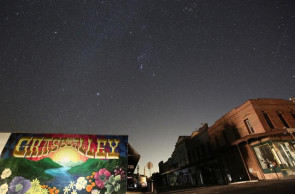warming
Is it too late to prevent climate change?
Global average temperatures have risen and weather extremes have already seen an uptick, so the short answer to whether it’s too late to stop climate change is: yes. But there’s still time to prevent cascading effects, as every degree of additional warming has exponentially disastrous impacts, experts say.
A 2021 report by the top body of climate scientists provided new analysis of the chance the world has to cap warming to 1.5 degrees Celsius (2.7 Fahrenheit) or 2 Celsius (3.6 Fahrenheit) since pre-industrial times in the coming decades, in line with global climate goals.
Although scientists estimated it’s still possible to stay within these limits, they said it would require immediate, rapid and large-scale reductions in greenhouse gas emissions. It’s more likely that global temperature will reach or exceed 1.5 degrees Celsius of warming, the report said.
Without major action to reduce emissions, the global average temperature is on track to rise by 2.5 to 4.5 degrees Celsius (4.5 to 8.1 degrees Fahrenheit) by 2100, scientists say.
And researchers warn that the situation will get very serious before then: Once the 1.5 degrees Celsius threshold is reached, there will be increasing heat waves, longer warm seasons and shorter cold seasons. When the 2 degrees Celsius mark is crossed, critical tolerance levels for agriculture and health will be reached.
Read more: UN, ADB to support Bangladesh's fight against climate change
But all hope is not lost, they urge.
At the time of the report’s release, Friederike Otto, a climate scientist at Imperial College of London, said achieving the 1.5-degree goal “is still possible from a physical science point of view.”
“If we reduce emissions globally to net zero by 2040 there is still a two thirds chance to reach 1.5 degrees and if we globally achieve net zero emissions by the middle of the century, there is still a one third chance to achieve that,” she said.
If all human emissions of heat-trapping gases were to stop today, Earth’s temperature would continue to rise for a few decades but would eventually stabilize, climate scientists say. If humans don’t emit any additional planet-warming gasses, then natural processes would begin to slowly remove the excess carbon dioxide from the atmosphere, and global temperatures would gradually begin to decline.
Read more: Bangladesh a key player in fight against climate change, says British envoy
“There is a direct relation between delay and warming, and between warming and risk of what we would call extreme impacts,” said Ajay Gambhir, a senior research fellow at the Grantham Institute for Climate Change and the Environment, based at Imperial College London. “ Unfortunately, we’re already seeing all these extreme impacts — whether it’s extreme heat waves, increased risk of crop failures, forest fires or bleaching coral reefs— already happening.”
3 years ago
UN to world leaders: To curtail warming, you must do more
Pressure keeps building on increasingly anxious world leaders to ratchet up efforts to fight climate change. There's more of it coming this week in one of the highest-profile forums of all — the United Nations.
For the second time in four days, this time out of U.N. headquarters in New York, leaders will hear pleas to make deeper cuts of emissions of heat-trapping gases and give poorer countries more money to develop cleaner energy and adapt to the worsening impacts of climate change.
“I'm not desperate, but I'm tremendously worried,” United Nations Secretary-General Antonio Guterres told The Associated Press in a weekend interview. “We are on the verge of the abyss and we cannot afford a step in the wrong direction.”
Also read: UN chief warns China, US to avoid new Cold War
So on Monday, Guterres and United Kingdom Prime Minister Boris Johnson are hosting a closed-door session with 35 to 40 world leaders to get countries to do more leading up to the huge climate negotiations in Scotland in six weeks. Those negotiations in the fall are designed to be the next step after the 2015 Paris climate agreement.
And all this comes after Friday, when U.S. President Joe Biden convened a private forum on climate to coax leaders to act now.
“We are rapidly running out of time,” Guterres said at Biden’s forum. “There is a high risk of failure” of negotiations in Glasgow.
This week’s focus on climate change comes at the end of another summer of disasters related to extreme weather, including devastating wildfires in the western United States, deadly flooding in the U.S., China and Europe, a drumbeat of killer tropical cyclones worldwide and unprecedented heat waves everywhere.
Achieving some kind of success in emission-cut pledges or financial help during the week of U.N. sessions would ease the path to an agreement in Glasgow, just as early announcements of pollution curbs did in 2015, especially those from China and the United States, experts said. Now those two nations are key again. But, Guterres said, their relationship is “totally dysfunctional.”
Nigel Purvis, a former U.S. State Department climate negotiator and CEO of the private firm Climate Advisers, said the political forces going into Glasgow don’t look as optimistic as they did four months ago after a Biden virtual climate summit.
But, he says, there is still hope. Countries like China, the world’s top carbon emitter, have to strengthen their Paris pledges to cut carbon pollution, while rich nations like the United States that did increase their emissions promises need to do more financially to help poorer countries.
Also read: ‘Code red’: UN scientists warn of worsening global warming
“The Glasgow meeting is not shaping up to be as well politically prepared as the Paris conference was in 2015,” Purvis said. And Pete Ogden, vice president of the United Nations Foundation for Energy and Climate, cited "worrying mistrust between nations at a time when greater solidarity is needed.”
As the world's leaders gather, activists, other government leaders and business officials gather in New York City for Climate Week, a giant cheerleading session for action that coincides with the high-level U.N. meeting. And throughout the week the push is on the rich nations, the G-20, to do more.
“It is true that the G-20 countries bear the biggest part of the responsibility for carbon emissions. And in that regard, of course it is absolutely crucial that we see them accelerating in a very important way their actions,” U.N. climate conference chief Patricia Espinosa said Friday as her agency announced that emission pledges for the Scotland conference were falling far short of the Paris goals.
The most stringent one seeks to limit warming to 1.5 degrees Celsius (2.7 degrees Fahrenheit) since pre-industrial times. That translates to about 0.4 degree Celsius (0.7 degrees Fahrenheit) from now because of warming that’s already happened.
A UN report on Friday showed that current pledges to cut carbon emissions set the world on a path toward 2.7 degrees Celsius (4.9 degrees Fahrenheit) of warming since the pre-industrial era. That shoots way past even the weaker Paris goal of limiting warming to 2 degrees Celsius (3.6 degrees Fahrenheit).
“That is catastrophic,” Guterres said in the interview. “The world could not live with a 2.7-degree increase in temperature.”
The overall goal is to have “net zero” carbon emissions by the middle of the 21st century. That refers to a moment when the world’s economies are putting the same amount of carbon dioxide into the air as plants and oceans take out of it, thus not adding to global warming.
Guterres is pushing for rich nations to fulfill their longtime pledges of $100 billion a year in climate aid to poor nations, with at least half of that going to help them cope with the impacts of global warming. So far, the world is falling about $75 billion a year short, according to a new study by Oxfam. Funding to cope with climate change's impacts fell 25% last year for small island nations, “the most vulnerable of the vulnerable,” he said.
Under the Paris agreement, every five years the nations of the world must come up with even more stringent emission cuts and more funding for the poorer nations to develop cleaner energy systems and adapt to climate change.
While the leaders convene for the U.N. meetings, activists, business leaders and lower-level government officials will be part of the cheerleading in a “climate week” series of events. Planners include big name corporations announcing billions of dollars worth of commitments to fighting climate change, lots of talk by big names such as Bill Gates about climate solutions, and even all seven late-night U.S. talk show hosts focusing on climate change Wednesday night.
“You’ve got the world leaders there, and so you can remind them about climate and get them focused on it” said Helen Clarkson, CEO of The Climate Group , which is coordinating climate week.
What counts most is what happens in six weeks in Glasgow, says Jonathan Overpeck, dean of environment at the University of Michigan, “But," he said, "the more that can be agreed upon early, the easier it will be to get the commitments that are needed to put an end to climate change. ... We’re not yet on an emissions reductions path that is safe for our planet and its people."
4 years ago
With warming, get used to blackouts to prevent wildfires
Washington, OCT 12 (AP/UNB) — Expect more preventative power blackouts in California as the climate gets hotter and drier and the wildfire season gets nastier and longer, scientists say.
6 years ago

.jpg)


